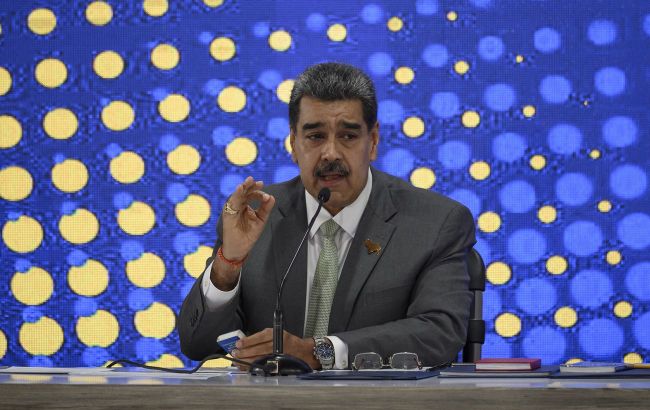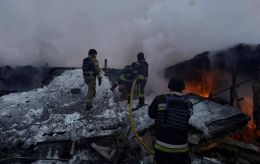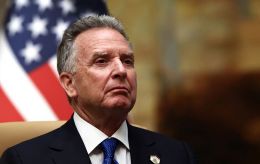US to launch attacks on Venezuela drug cartels within weeks - NBC
 President of Venezuela Nicolás Maduro (Photo: Getty Images)
President of Venezuela Nicolás Maduro (Photo: Getty Images)
The US military is developing operations to strike drug traffickers in Venezuela. Attacks could begin within a few weeks, reports NBC News.
According to four sources cited by the outlet, strikes on Venezuelan territory could take place in the coming weeks, although US President Donald Trump has not yet made a decision.
Plans under discussion primarily involve drone strikes against members and leaders of drug trafficking groups, as well as strikes on drug production laboratories.
Two of the sources and another official familiar with the discussions said that the recent US military escalation is partly due to the administration’s view that Venezuelan President Nicolás Maduro has not done enough to stop the flow of drugs from the country.
Some Trump administration officials are frustrated that the US military escalation has neither weakened Maduro’s power nor provoked a noticeable reaction. At the same time, the White House has received more criticism than expected over strikes on drug-trafficking boats, leading the administration to carefully consider its next steps.
“Trump is prepared to use every element of American power to stop drugs from flooding into our country and to bring those responsible to justice,” a senior administration official told the network.
Previously, Maduro denied any involvement in drug trafficking and repeatedly claimed that the US is trying to remove him from power.
On the question of possible US strikes on Venezuela, political analyst Aníbal Sanchez Ismayel told NBC News that an attack on Venezuelan territory would have consequences.
“An attack on Venezuelan soil would have consequences from diplomatic protests to an increase in political persecutions of those they classify as collaborators, to further uniting the population with the need to defend sovereignty reaffirmed,” he said.
Risk of strikes and likely consequences
Sources familiar with the discussions said that, given recent events, US strikes on Venezuela would not be unexpected.
According to US military data, the US recently deployed at least eight ships with more than 4,000 service members to the region’s waters and sent F‑35 fighters to Puerto Rico.
“You don’t move that many resources down there without looking at all options,” said a source familiar with the administration’s position.
This is especially relevant because keeping thousands of troops, ships, and aircraft in the region can begin to affect other deployments.
Another interlocutor said, “You can’t keep that kind of firepower in the Caribbean forever.”
Illegitimate Maduro
Venezuela is not a major cocaine producer but is considered a key transit point for drug flights. At the same time, the country is not seen as a source of illegal fentanyl, which primarily comes to the US from Mexico.
In 2020, during Trump’s first term, the US Department of Justice charged Maduro with drug trafficking. The Trump administration accused him of cooperating with cartels that ship cocaine, fentanyl, and gang members to the US.
Officials in the current Trump administration do not rule out regime change as one of the objectives of these operations and are increasing direct pressure on the Venezuelan president.
The goal is to push Maduro into making hasty moves that could ultimately lead to his removal from power without a US ground operation. One of the main proponents of regime change is Secretary of State Marco Rubio.
The Venezuelan government reported on social media that Maduro sent a letter to Trump proposing to start a dialogue. White House Press Secretary Karoline Leavitt confirmed that Trump received the letter but condemned it.
“Frankly, I think there were a lot of lies that were repeated by Maduro in that letter, and the administration’s position on Venezuela has not changed. We view the Maduro regime as illegitimate, and the president has clearly shown that he’s willing to use any and all means necessary to stop the illegal trafficking of deadly drugs from the Venezuelan regime into the United States of America,” Leavitt said.
Diplomatic efforts
According to NBC, negotiations are taking place between the US and Venezuela with the involvement of mediators from Middle Eastern countries. With their help, Maduro is reportedly willing to make concessions to maintain his hold on power.
The US continues to coordinate with Venezuela on certain issues, including deportation flights. As of last Friday, there had been 54 such flights.
Special Presidential Envoy for Special Missions Ric Grenell remains in constant contact with Trump and continues to advance diplomacy with Venezuela as one possible approach.
When asked for a comment, the White House referred NBC News to a previous statement by the president, saying that they would see what happened and noting that Venezuela was sending their gangsters, drug traffickers, and drugs, which he considered unacceptable.
The Pentagon declined to comment.
Escalation between the US and Venezuela
In August, US President Donald Trump signed a secret directive allowing direct military operations against Latin American drug cartels, which have been designated as foreign terrorist organizations.
The US announced a reward for Maduro’s arrest and raised the bounty to $50 million.
Currently, a number of US ships and approximately 4,500 service members are stationed in the southern Caribbean Sea.
The US has carried out a series of strikes on drug-trafficking boats, and Venezuela even carried out an aerial provocation against US ships.

